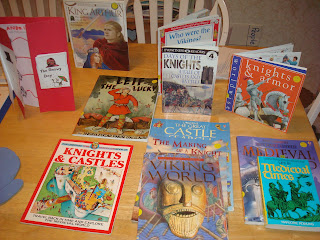But the children kept wanting to do one, and I admit that I wanted to "wrap up" that time period in my mind, so with about one hour of planning and about three hours of prep time (for me, all food related), we had our Unit 1 celebration! I like to do things with excellence, and I'm not proud of the small amount of time we spent throwing this together, but I share that to encourage those of you who feel that you "just don't have time" to do unit celebrations. Believe me when I say, it doesn't have to be a spectacular production (although if it is, that's great too!), and if I had time to do it, you have time too! The main thing is to have fun and make memories together!
I told the children that we had to create costumes from items we already had. No sewing this time around. I set them loose with the dress up box, and they came up with some pretty good costumes in very little time!

We displayed some of the books we used in our studies,

as well as a timeline notebook, and a history notebook open to a map of the crusades. Grandma and Grandpa were enthralled with the books, and couldn't believe that all of them were ours! :-)

We also displayed some of Little Man's lapbooks from his class at our Friday co-op. He loves his class! (and his teacher! no, it's not me) :-)

We had our program first while the stew finished cooking. First we had a Viking visit us ~ Eric the Red no less! He told about where the Vikings lived, when they lived, and what they did. He told us about his son Leif, who was an explorer and who "discovered" Vinland, what we now call Newfoundland. He was interviewed by a modern day reporter who had traveled back in time!

Next we had the legendary King Arthur share. He told us about how he was the only one who could pull the sword from the stone, fulfilling the prophecy that the one who could do that would be the rightful king of Britain. Then he shared a story about how he slew a dragon (creative writing assignment). It was tense and exciting!

Next to visit us was this Mongolian, who told us about daily life as a Mongol living under Genghis Khan.

Following closely behind the Mongol on our historical timeline was this person: Marco Polo! He shared about his journey to China when he was just 17, to meet Genghis's grandson, Kublai. He ended up becoming a trusted official of the Khan, and worked in his government for many years before eventually returning to Venice and writing a book about his travels ~ a book which a young man named Christopher Columbus almost certainly read.

Then we were graced by the modern day reporter once again, as she traveled to the time period just before the Renaissance and Reformation. She shared with us about the struggle and persecution of a few individuals who labored to translate God's Word into the languages of the common people, and about the printing press which made the Bible available to so many for the first time! What an intense, dangerous, and important time in our christian history!

She even had a field reporter who was able to report live, from the scene in Bohemia.

Her report was SO well done, I am going to reprint it here in its entirety. It's long, but worth the read. This represents several weeks of study for her during the fall, and was also her "final" (she got an A!). When we started using Tapestry of Grace, our daughter was barely an upper grammar student, and we had four lower grammar boys beneath her. I used to dream about those great socratic discussions that those with high schoolers could have, and wonder if we would ever get there. Well, we got there! While this is not a discussion, the script she wrote for our unit celebration clearly shows that she correctly analyzed and synthesized the information on these men and their role in laying the foundation for the coming reformation. She got it. Yay! This is what those early years were leading up to!
"Hello, and welcome to Christian Historical News. I am _____ and our topic today is the Foundation of the Reformation. I am here in 12th century England where a peasant revolt has just been put down. It is no secret that the Roman Catholic Church has some major issues these days. Church leaders have been involved in scandal after scandal. The Pope and many of the bishops are more concerned with their political power than fulfilling their spiritual duties. They often seem willing to sacrifice anything for their political success. As a result, the papacy and church have suffered greatly, as you can see.
Ever since John Wycliffe wrote his first two treatises in 1374 on Divine Dominion and Civil Dominion, arguing that all human authority is derived directly from God and is conditional on God's approval, he has been seen as an enemy of the church and a friend to the common people. In fact, the peasants even asked him prior to the uprising to join them in their revolt, which I have just learned was spurred on by his ideas. However, Wycliffe told me he had never intended for violence to be a result of his teaching, and he politely refused their offer, although he was sympathetic to their cause. His beliefs consist of believing that God and the Bible hold the ultimate authority, not the pope. He spends his spare time studying the Bible, comparing its teaching with that of the church, and urging the church leaders to return to the standards of behavior and doctrine based on the Bible alone. His writings have been transmitted to the University of Prague in Bohemia, where one of the prominent students, Jan Hus, read them and has gone from a devoted follower to a leader himself. We will now hear from our field reporter there. Mike?
(she puts on sunglasses and a cap to look like a boy reporter)
Yes, I have the privilege of observing a church council here in Constance, in the year 1415, where Jan Hus has just been summoned to appear before them. I believe the council members want him to renounce his beliefs. He has found himself strongly attracted to the views of John Wycliffe. In particular, he believes Wycliffe's view that the Bible, as well as the prayers and readings at the worship services, ought to be in the language of the people, not in Latin, which nobody understands anymore. He also believes strongly that both the bread and the cup should be given to all. It is currently the practice of the church to give only the consecrated bread to the people during communion. Drinking the consecrated wine is reserved for the priests only.
In 1410 the Archbishop of Prague ordered all of Wycliffe's writings to be burned. When Hus refused, he was excommunicated from the church. Eventually he was summoned to answer the charges against him, which brings us up to the present. Jan Hus has arrived, and..... oh my. He has refused to renounce his faith and..... he is being dragged off to jail. This is not good. I'm going to see if I can help at all. Back to you.
(she takes off sunglasses and cap to be the girl reporter again)
Oh dear. I hope things turn out okay for you, Mike, and for Jan. But at least he was not arrested for nothing. Now, both Hus and Wycliffe have left a legacy and their beliefs have quickly caught on. I am now standing in front of Johann Gutenberg's first printing shop in the town of Mainz, Germany. Gutenberg invented the printing press in 1455, which was no easy task and took years to accomplish.
I am holding in my hand one of the first books he ever printed with his new press: the Bible. He first experimented with some grammar books, but the first actual book he finished was the Biblia Latina. It was in Latin, but eventually was translated into other languages. As you can imagine, printing was so much easier, faster, and cheaper than copying by hand. Before the printing press was invented all the books had to be copied down by hand, which was much more expensive and resulted in countless errors. Thanks to Gutenberg, the Bible is now available to everyone in his native language. The common people can now read God's Word for themselves, which before had been unimaginable!
Though the fight is not over yet, and the people who have begun to follow this new belief are being persecuted, Wycliffe, Hus, and others have opened up the door for the reformers. Blooming from the progress of those early protestant leaders, people such as Martin Luther and John Calvin will arise and push the Protestant Reformation into action. John Wycliffe, John Hus, and Johann Gutenberg have set off a spark that will burst into an unstoppable fire. Until next time, this is Christian Historical News wishing you a good night."
After this well crafted report we had our dinner of stew in bread bowls, and fruit.



It was a fun and informative unit celebration, and the important thing is that it got done! We are having our unit 2 celebration in three weeks when my parents are here visiting (since they live far away and normally miss them), and six weeks after that we will be wrapping up unit 3 already! Unbelievable how this year is flying by!




2 comments:
Great job,everybody!It looks like a fun time was had by all. I am looking forward to having my mom and stepdad here part time now so that we could invite them to something like this. If I can only convince my other TOG friends of the same thing.
Wow, this is wonderful and so inspiring! Please give your daughter a "kudos" from us. Her paper was great and very informative. It looks like you all had a great time and the kids appeared to have had lots of fun as well! God bless!
Post a Comment